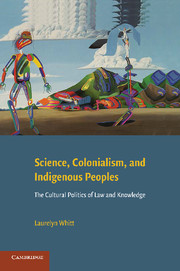Book contents
- Frontmatter
- Contents
- Preface
- Acknowledgments
- First Words
- PART I BIOCOLONIALISM AS IMPERIAL SCIENCE
- PART II THE HUMAN GENOME DIVERSITY PROJECT: A CASE STUDY
- 4 The Rhetoric of Research Justification
- 5 Indigenist Critiques of Biocolonialism
- PART III LEGITIMATION: THE RULE AND ROLE OF LAW
- Conclusion – The Politics of Knowledge: Resistance and Recovery
- Bibliography
- Index
- References
5 - Indigenist Critiques of Biocolonialism
Published online by Cambridge University Press: 04 August 2010
- Frontmatter
- Contents
- Preface
- Acknowledgments
- First Words
- PART I BIOCOLONIALISM AS IMPERIAL SCIENCE
- PART II THE HUMAN GENOME DIVERSITY PROJECT: A CASE STUDY
- 4 The Rhetoric of Research Justification
- 5 Indigenist Critiques of Biocolonialism
- PART III LEGITIMATION: THE RULE AND ROLE OF LAW
- Conclusion – The Politics of Knowledge: Resistance and Recovery
- Bibliography
- Index
- References
Summary
We are not opposed to sharing with humanity. What we oppose is being exploited when our poverty is not resolved.
– José AcostaAt the June 1993 session of the United Nations Commission on Sustainable Development, indigenous representatives described the Human Genome Diversity Project (HGDP) as “very alarming”: “We are calling for a stop to the Human Genome Diversity Project which is basically an appropriation of our lives and being as indigenous peoples.” They also raised concerns about patenting and commercial exploitation: “How soon will it be before they apply for IPRs [Intellectual Property Rights] to these genes and sell them for a profit?” That same year, a workshop on the “Ethical and Human Rights Implications” of the HGDP convened, during which it was suggested that sampling begin “with the least politically risky groups…If the Project does not proceed carefully and properly, it could spoil the last good opportunity to obtain some of this data.” What were “proper procedures?” Paul Weiss, an anthropologist, proposed the following strategy, according to the summary report:
“Immortalization” can be a very sensitive term and should be avoided when talking about the intended creation of cell lines. (Someone suggested using “transformation,” the standard European practice.) Whether to tell people what you intend to do, as a technical matter, is a difficult question.
As one favorable article in the journal Nature understated: “the [Diversity Project] has insufficiently anticipated the inevitable objections to it.”
- Type
- Chapter
- Information
- Science, Colonialism, and Indigenous PeoplesThe Cultural Politics of Law and Knowledge, pp. 105 - 132Publisher: Cambridge University PressPrint publication year: 2009



